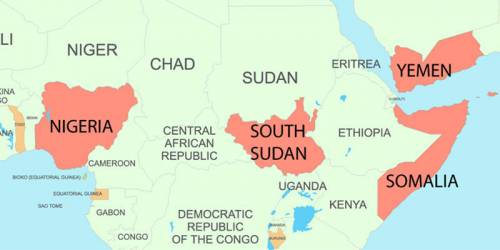Special Offerings ministries highlight a Nigerian partner
by Rich Copley | Presbyterian News Service

The One Great Hour of Sharing ministries began working with CISCOPE in Northern Nigeria after the United Nations declared famine during 2017 in four countries: Nigeria, South Sudan, Yemen, and Somalia.
LEXINGTON, Kentucky — As the One Great Hour of Sharing campaign for 2022 enters its home stretch, the ministries supported by this offering presented a webinar Tuesday highlighting one of its partners in Africa.
Presbyterian Disaster Assistance, the Presbyterian Hunger Program and the Presbyterian Committee on the Self-Development of People are supported by your gifts to OGHS, traditionally received by churches on Palm Sunday or Easter, though you can give to the offering year-round. All three programs are part of the Presbyterian Mission Agency’s Compassion, Peace & Justice ministries.
All three ministries focus on Matthew 25 goals of eradicating systemic poverty and dismantling structural racism, which are definitely issues being addressed by the Civil Society Coalition for Poverty Eradication (CISCOPE) in Northern Nigeria.
Click here to learn more about One Great Hour of Sharing and give to the offering
Dayna Oliver, PDA’s Associate for International Program Administration, explained at the beginning of Tuesday’s 75-minute “OGHS Around the World” webinar that the PC(USA) began working with CISCOPE in 2017, when the United Nations declared famine in Nigeria, South Sudan, Yemen and Somalia. Famine means more than 20% of the families in impacted countries are facing an extreme lack of food, meaning 22 million people in those countries were at risk of starvation.
“So, we began working to build connections and relationships in the four countries in order to respond and to support communities,” Oliver said. “CISCOPE came highly recommended.”
“CISCOPE has been working to support people on the ground who are coming back trying to rebuild their lives,” Oliver said. “Over the past five years the three programs … have been involved in various ways through the One Great Hour of Sharing.”
Click here to see the April 5 episode of ‘OGHS Around the World’ in its entirety

Peter Egwudah
Peter Egwudah, Program Coordinator for CISCOPE in Nigeria, joined the webinar for a presentation about the program’s work supported by the PC(USA) since 2019. He started by detailing major challenges people in the region face, including the lingering insurgency by the terrorist organization Boko Haram, which has made international headlines for abductions, murders, and other criminal activity in Norther Nigeria and neighboring countries such as Cameroon, Chad and Niger.
Boko Haram combined with the impact of natural disasters — including flooding, corruption, and poor governance — have disrupted farming and other livelihoods, resulting in food insecurity and displacement. Women and children have been particularly hard hit.
“It seems as if those who are the criminals among the majority of the citizens always have their way,” Egwudah said. “And when they go to court, or they’ve been arrested by the police, nothing is done to them. So, there’s this general impunity in the country, and criminality is a sure way to go. And on top of that is corruption. And all this put together … breeds corruption, breeds crisis, and at the end of the day, general food insecurity in the country.”

CISCOPE, the Civil Society Coalition for Poverty Eradication, a PC(USA) partner, serves Nigeria’s most vulnerable populations, including women farmers. (Photo by Valéry Nodem)
Egwudah went through several interventions by the OGHS ministries, which have supplied Nigerians with resources such as rice, vegetable seed, agricultural machinery and training in areas from disaster preparedness to advocacy to farming practices. Each intervention impacted hundreds of households, including direct food service to hundreds of female-headed households, and specific COVID-19 interventions, including the distribution of personal protective equipment and information.
The results of the OGHS work in Egwudah’s communities included restoration of livelihoods, improved farming practices, growth in household income, protection from COVID-19, and additional economic opportunities. It also raised awareness of the situation in Nigeria. He said 70% of the beneficiaries were women or other vulnerable groups, which he said is unique in terms of aid the region usually receives.

With help from groups like CISCOPE, a partner of the Presbyterian Hunger Program, Nigerian farmers are hopeful about future crop production. (Photo by Valéry Nodem)
“I can say categorically that these funds touch most of the people who are neglected, who have not been mentioned by any donor before,” Egwudah said. “Some of them have never benefited from the government or any other person. But with this fund, we were able to reach the most vulnerable in the community.”
Egwudah will be one of 10 International Peacemakers coming to the United States from Sept. 16 to Oct. 10 with the Presbyterian Peacemaking Program’s International Peacemakers event. During that time, Egwudah and other Peacemakers will be visiting with churches, mid councils, and communities around the country. Itineraries are still being determined.
![]() You may freely reuse and distribute this article in its entirety for non-commercial purposes in any medium. Please include author attribution, photography credits, and a link to the original article. This work is licensed under a Creative Commons Attribution-NonCommercial-NoDeratives 4.0 International License.
You may freely reuse and distribute this article in its entirety for non-commercial purposes in any medium. Please include author attribution, photography credits, and a link to the original article. This work is licensed under a Creative Commons Attribution-NonCommercial-NoDeratives 4.0 International License.
Categories: Matthew 25, Peace & Justice, Special Offerings
Tags: ciscope, civil society coalition for poverty eradication, compassion peace & justice ministries, dayna oliver, dismantling structural racism, eradicating systemic poverty, international peacemakers, matthew 25 invitation, nigeria, oghs around the world, One Great Hour of Sharing, Peter Egwudah, Presbyterian Committee on the Self-Development of People, presbyterian disaster assistance, presbyterian hunger program, Presbyterian Peacemaking Program, somalia, south sudan, Special Offerings, yemen
Ministries: Compassion, Peace and Justice, Special Offerings, Matthew 25 in the PC(USA): Join the Movement